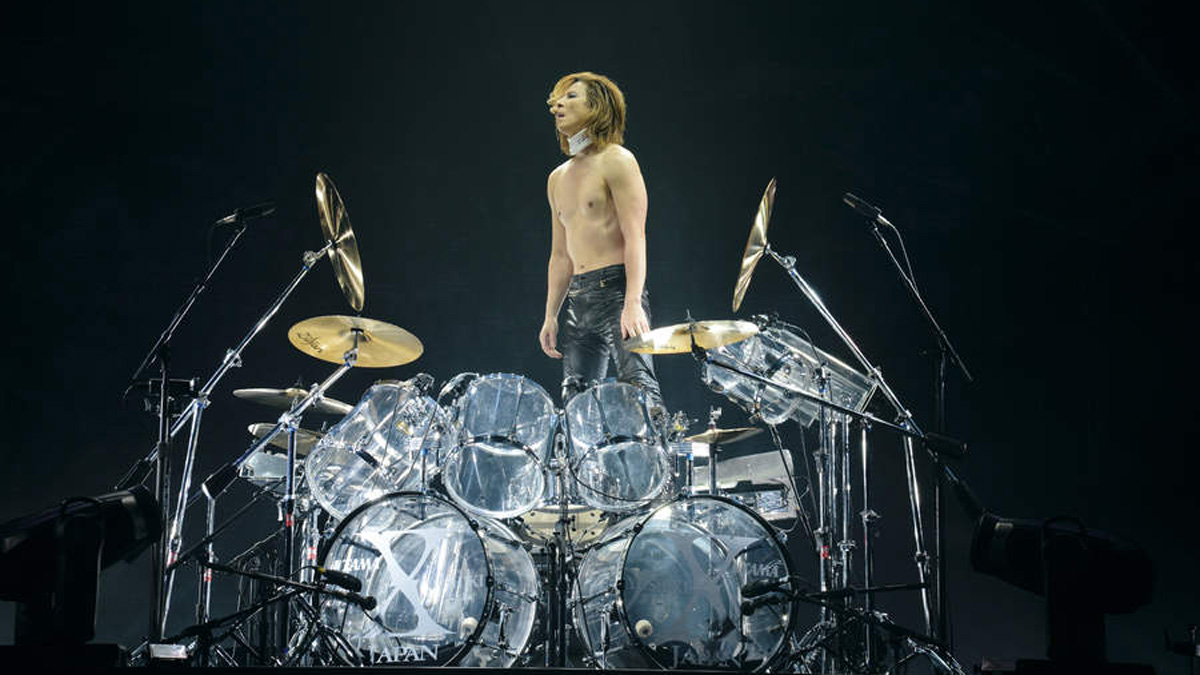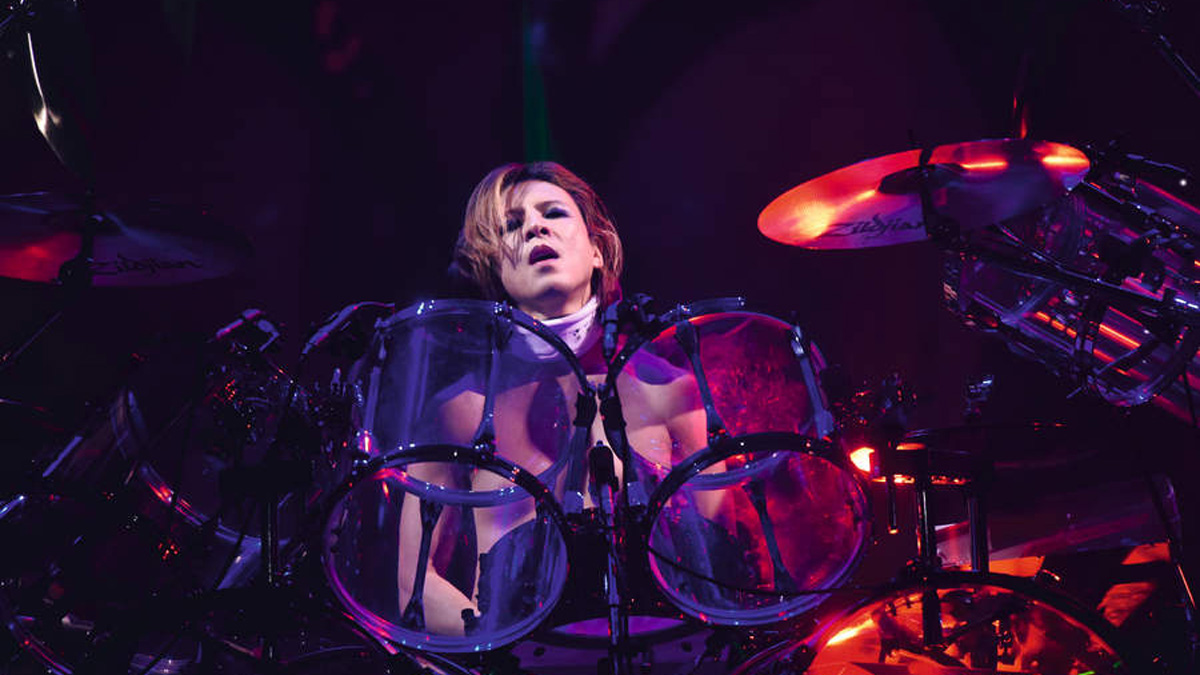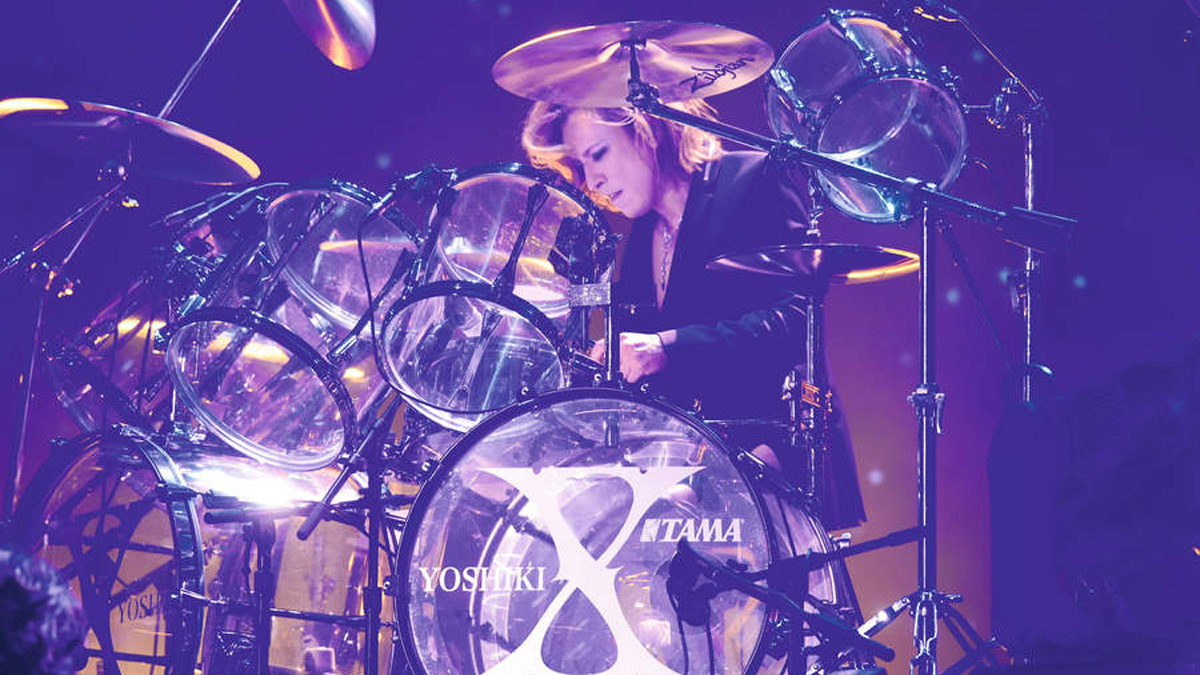X Japan founder Yoshiki: “I had a death wish. If I’m going to die, I’m going to die on stage, so that’s why I would jump into my drumset.”
Yoshiki talks brainwashing, We Are X and playing like there’s no tomorrow

The X Factor
To describe Yoshiki, founder of X Japan, as a rock star somehow seems woefully inadequate.
In addition to being the drummer, songwriter and pianist in the band, he’s performed classical piano concerts around the world, composed music for the Emperor of Japan, and inspired his own Hello Kitty figurine, Yoshi-Kitty.
At the very expensive London hotel where we meet Yoshiki, a grand piano has been installed in his suite - he says he’s practising some Rachmaninov - and several strikingly beautiful young women recline languidly around the room. The rise, spectacular fall and rise again of X Japan has been chronicled in Stephen Kijak’s documentary We Are X and it’s a tale that almost sounds too outlandish to be true.
The band split up in 1997 when vocalist Toshi was brainwashed into joining a religious cult, lead guitarist Hide died in 1998 having apparently killed himself, then former bassist Taiji hung himself in 2011.
I cut myself so many times on my cymbals
Tragedy has defined Yoshiki’s life - his father took his own life when Yoshiki was just a child and he turned to music as an outlet and escape. X Japan’s early style was a pummelling blend of thrash metal and glam rock imagery known as Visual Kei, although they’ve since moved towards symphonic, progressive rock.
Their legendary live performances have seen Yoshiki pushing himself to exhaustion and the years of headbanging and hard playing have taken their toll. He’s undergone surgery in 2009 and 2017 to repair the damage to his back and neck. But he’s not finished yet.
How far along is the new X Japan album? The band’s last studio release, Dahlia, was in 1996!
“It’s a matter of time, could be several weeks, to be done. Actually, I’m working while in England too. One song I started mixing in LA a week ago, I just came from Tokyo yesterday.
"I was mixing in Tokyo over the internet to Los Angeles, and I couldn’t finish it because I had rehearsals and a TV show and film premiere, then I came here so I want to finish that particular song. I’m on the road but I’m still working. It’s very close. People won’t believe me but it’s very close.”
In the 1990s when you first tried to break into the US, was the outrageous Visual Kei image a hindrance?
“I don’t think we were ready. Also, the world was not ready. First of all, we didn’t speak English. When I watch that film, oh, my English is terrible! My English is not perfect yet but that was terrible. It’s great we didn’t give up. After that X Japan broke up and then reunited and everything.”
Now you’re playing shows in Madison Square Garden and Wembley Arena. What’s changed?
“At that time, there was no internet, so our music, our culture didn’t spread throughout the world. It was just there in Japan. After several years our music started spreading throughout the world because of the internet, so that’s the biggest change I guess.
"Before, we had to just tour, we still do, all the bands from anywhere had to tour around the world to get recognised but these days there are different ways of doing that. I’m not saying that doing a world tour is a bad idea, we still have to do it, but we can do something different these days.”
Is the live show vital now album sales have shrunk in the streaming age?
“Yes. I think more people are listening to the music than before because it’s easier to access but at the same time, album sales have kept declining. Also, we’re losing the definition of what an album is. Why do we need to release an album? I was fighting with the label, ‘Why are we doing an album? These days people just listen to hit songs, singles.’ I still don’t have an answer.
"More people listen to us, so more people come to the concerts as well. Twenty years ago, it was almost impossible for X Japan to play Wembley Arena but because of the internet I think we can play that kind of place now.”
Your physical drumming style seems to have been very hard on your body?
“It’s quite a contradiction because I try to care about my health but at the same time I try to destroy my body. It’s so strange. I had a death wish. If I’m going to die, I’m going to die on stage, that’s how I was thinking, so that’s why I would jump into my drumset.
"I cut myself so many times on my cymbals, but when I’m in the right state of mind, I try to stretch, look after my body, go to the doctor. But when I’m on stage I’m very suicidal. It’s very weird. Our show is so intense, we play like there is no tomorrow, so we can’t do so many shows in a month.
"We have to take a break otherwise we’re going to be dead, it’s not easy for us to play show after show. We have to hit certain cities, major cities, of course you want to go to as many places as possible, but physically it’s not possible.”
Are there songs where you take a deep breath and think, okay, this is going to be tough?
“Art Of Life, which is originally a 30-minute song. These days we’re playing the third movement which is pretty tough. Also, there are some songs where I’m going back and forth between piano and drums. Drumming is like running, playing piano is like stopping and drinking Japanese tea.”

Hold the carbs
In the documentary you talk about dreaming of cheesecake because you’ve not eaten any carbs. Do you have a strict diet and exercise routine?
“I try to. When I came here from Tokyo to London yesterday, I was trying not to eat carbohydrates and the guy next to me was eating noodles. I wanted to punch him, but I didn’t of course!
"After the show I’m going to drink a lot of alcohol and eat whatever I want. I can’t wait. One week from now I’m going to eat everything! Cheesecake too! That video was shot before we played Madison Square Garden. New York cheesecake is very famous throughout the world, so I was dying to eat some.”
I worked with George Martin, he produced my classical album at Air Studios in London. The London Philharmonic played my compositions
When you do your Yoshiki Classical performances, who comes to the shows? X Japan fans?
“That’s a good question. I just performed at Carnegie Hall in New York about a month ago, I did two nights. Some of the audience is the classical audience, some of them are heavy metal, punk rock kids. I love that. It’s wonderful. My classical concerts are a little unconventional. I use video, project some images, I play a bit of Tchaikovsky, I play some X Japan songs but as classical versions, I play the piano concerto I composed for the Emperor of Japan.
"Several years ago, I composed the theme song for the awards show for the Golden Globes in America. At that time, people around me said, ‘Yoshiki, why don’t you release a compilation of what you’ve been composing?’ In addition to the piece I composed for the Emperor of Japan, I also did a classical composition for the World Expo, so we released that. I did a showcase at the Grammy Museum in Los Angeles and my agent came to see that show, my agency is William Morris.
"They said, ‘Yoshiki, you’re going to go on a world tour doing classical music.’ ‘No, I don’t want to.’ Anyway, they convinced me, I was really nervous, but I did 10 countries or so and that was successful. I jumped into that situation without really thinking about it.”
Is it a very different experience doing a classical concert versus a rock show?
“Emotionally it’s the same but technically it’s different because you can’t miss one note. At a rock concert, who cares if I miss one tom hit? Come to think of it, my first big classical experience was here in London.
"I worked with George Martin, he produced my classical album at Air Studios in London. The London Philharmonic played my compositions.”
Working with George Martin, did you ever pinch yourself to make sure it’s real?
“I’m like, I must be dreaming. I watched our film We Are X, that’s so unreal. There was a very sad side to that, almost like a nightmare. I lost my father, I lost my band members, did it really happen? I played Carnegie Hall, did it really happen?”

'Drumming is like running, playing piano is like stopping and drinking Japanese tea'
We think of Japan as being socially conservative. When X Japan started, did you shock people?
“Yes. Japan was even more conservative 20 or 30 years ago. At that time, you didn’t see blond-haired guys in Japan - we had long hair and spikes and everything. Musically there were not many thrash metal bands in Japan’s music scene. There were some who were underground but nobody very big who became mainstream. We wanted to shock people. For some reason my mother was okay with it.
"When I dyed my hair red, people around me freaked out. I dyed my hair red and went to school. At that time, I can’t believe this, my teacher grabbed me and shaved my head. It was that conservative in Japan.”
How did you go from there to composing for the Emperor?
“I did classical music before I started doing rock music so classical is my background. That was quite shocking, that was a surreal moment. It was such an honour for me to do it. I was listening to symphonies all the time.
I remember that day I performed for the Emperor, I think CNN or someone said something like ‘Royal Family Meets Rock’
"I remember that day I performed for the Emperor, I think CNN or someone said something like ‘Royal Family Meets Rock’. Probably some rock artists are against that kind of thing, but we’re not. Before, I was anti-everything, I was a rebel against everything.”
How did you work with We Are X director Stephen Kijak?
“Regarding the documentary, I was asked to do this a long time ago, even before X Japan broke up we were planning on doing that, but after Toshi the lead singer got brainwashed and joined a cult and Hide, the guitar player, passed away, it was too painful to go back to those memories. So that project was stopped completely, then several years ago my agent in America asked me, ‘Why don’t we create a documentary film? It’s an amazing true story.’
"I said it’s too painful, but they convinced me that this story could help people’s lives. Then who should we have direct or produce? I said, ‘I can’t do it, I can’t even watch our concerts, it’s too painful.’ I suggested maybe we should hire a director who has zero idea about X Japan.
"It was pretty much impossible to find a director or producer in Japan because they all knew us. My agent introduced me to several directors around the world, then John Battsek from England, he produced Searching For Sugarman which I thought was amazing, he and I talked about looking for directors and he recommended Stephen Kijak. He shot the Rolling Stones [Stones In Exile], I thought he was great and he had zero idea about X Japan, that’s why I thought he was perfect.”
Did you have much editorial control over the film or did you hand everything over to Stephen?
“I pretty much handed it to him. There are a bunch of scenes I did not like but since I gave it to him, it’s not my choice. It’s his choice. We’re still an ongoing band. If we were done, if we were dead, they could create anything, but we’re still doing it. Some of the images, it was like, ‘Oh, do you want to show that?’ I didn’t even like the scene where I was falling from the stage wearing that [body] stocking.
"I was like, ‘Can you remove this?’ The director said, ‘No. You said I can use anything.’ We talked about it several times, but I gave up. If he thinks it’s great, it’s great. Same for Toshi. He can see the time he was brainwashed, it was very scary, so Toshi was hesitating, ‘Do we have to use this?’ But the director wrote a letter to Toshi saying how important it is to show that brainwashed era. It was not an easy process.”
There’s a great scene when a DJ asks you why you split up and you say, ‘My singer was brainwashed’.
“Yeah, exactly so. I was at the Classic Rock Awards here in England, that was 2015, I walked on the red carpet. Someone asked me, ‘Has X Japan finally come back together? Why did you break up in the first place?’
"I said, ‘My vocalist got brainwashed.’ Then the journalist was like, ‘Do you speak English?’ She thought I didn’t understand the question. People have very interesting reactions.”
Are you still hungry as a band - even after all your success?
“We’re big in Japan, maybe Asia, but we’re pretty unknown outside of it, so we still have a lot of things to do. Our members who passed away, Hide and Taiji our bass player, X Japan doesn’t exist without them. It’s because of those members that we became X Japan and they wanted us to go overseas.
"They talked about it every day but while we were together with them, we couldn’t do any shows [overseas]. I want to keep doing it, as long as I keep doing it, people will know about Hide and how amazing he was, how amazing Taiji was. That’s one of the biggest reasons I’m doing it.”